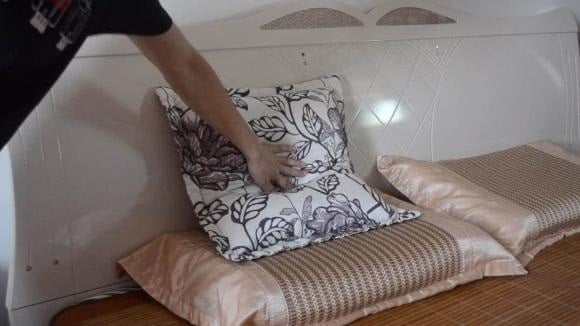The Benefits of Positioning Your Bed Against a Wall
The placement of your bed in the bedroom is an important factor that can impact both your health and wealth, according to feng shui principles. One common consideration is whether to place the head of the bed against a wall or leave it “floating” in the middle of the room.

The importance of positioning the bed head against the wall for both aesthetic and practical reasons.
1. Stability and Safety
Placing the head of the bed against a wall creates a sense of stability and solidity. When we sleep, having a solid wall behind our backs can provide a sense of security and comfort. This arrangement reduces anxiety and stress, making us feel more protected and relaxed.
2. Space Optimization
In modern living spaces, optimizing floor area is crucial. Positioning the bed head against a wall saves valuable space, allowing for more efficient and neat arrangement of other furniture. Leaving the head of the bed away from the wall wastes precious square footage, reducing the usable space in the room.
3. Feng Shui and Energy Flow
Feng shui principles suggest that having the head of the bed against a wall creates a positive energy flow, bringing peace and stability to your sleep. The wall behind the headboard acts as a solid “back support,” promoting deeper and more restful sleep. Conversely, a bed without the support of a wall can disrupt energy flow, potentially affecting the health and mental well-being of the occupant.
4. Convenience and Practicality
Placing the bed head against a wall also has practical advantages, reducing the risk of bumping into it and making daily activities more convenient. When the bed is in the middle of the room, tasks like cleaning and moving around become more challenging. Having the bed against a wall makes it easier to maintain, avoids accidental collisions, and enables better organization of the bedroom space.
5. Aesthetic Appeal in Interior Design
From an aesthetic perspective, positioning the bed head against a wall creates a harmonious and balanced layout for the bedroom. It makes the room appear neater, tidier, and more spacious. Additionally, the wall behind the headboard can be utilized for decorative purposes, such as hanging artwork, placing bedside lamps, or displaying other decorative items, creating a focal point for the bedroom.

Positioning your bed against the wall: Additional feng shui considerations to avoid common pitfalls.
Tips for Bed Placement in the Bedroom
Consider the following guidelines to ensure optimal health for the occupants and efficient use of living space:
Avoid positioning the head of the bed directly in line with the door.
If your home is prone to drafts, placing the bed in line with the door can result in cold drafts blowing directly onto the bed, potentially affecting your health. From a feng shui perspective, the bed and the door are considered conflicting elements, and positioning them directly opposite each other can lead to restlessness and insomnia.
It is advisable to position the bed slightly off to one side, away from the direct path of the door.
Do not place the head of the bed facing or adjacent to the bathroom.
Bathrooms, even with regular cleaning, can harbor bacteria. The sound of flushing or showering can also disrupt sleep. Therefore, avoid positioning the head of your bed directly facing or adjacent to the bathroom.
Refrain from placing the bed directly opposite a mirror.
According to feng shui principles, mirrors reflect negative energy back at the occupant. Therefore, it is best to avoid placing mirrors directly opposite the bed or facing the bed. A mirror opposite the bed can induce a sense of confusion, disrupt deep sleep, and even lead to sleep paralysis.
Ideally, mirrors should be placed in corners or away from the bed, and it is recommended to avoid having mirrors in the bedroom altogether.
Avoid positioning the head of the bed directly under a window.
While it may seem appealing to place the bed by the window for added ventilation and natural light, it is not advisable. Positioning the bed by the window can expose you to external noise, drafts, and excessive sunlight, all of which can disrupt your sleep.
It is best to position the bed away from the window and install curtains or blinds to control light and privacy.
2023 Lunar New Year Gift Ideas for Older Family and Friends
As 2021 approaches, families worldwide are gathering to celebrate the special bond between grandparents and their grandchildren. To show their love and admiration, these thoughtfully chosen gifts will bring a smile to the face of the elderly. Here, we have compiled a list of the 13 most meaningful Tet presents that can bring joy to our beloved grandparents.




































